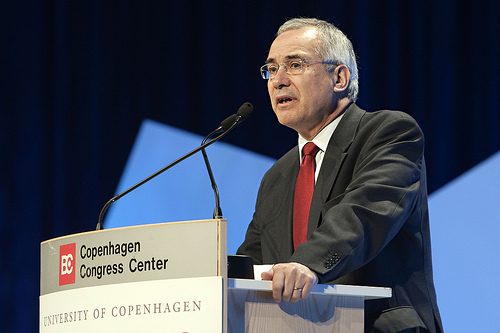Cross-posted from the Wonk Room. This is the second in a three-part interview with economist Lord Nicholas Stern on climate policy. You can watch part one here.
Lord Nicholas Stern, one of the world’s most prominent climate economists, believes that the fight against global warming will lead to the next industrial revolution.
In the second part of an exclusive interview with ThinkProgress, Stern describes the scale of the challenge to wean civilization off its dependence of unsustainable fossil fuels. Since the consequences of failure are on the almost unimaginable scale of global war, this challenge is a necessary one. Stern is actually inspired by the scope of action, recognizing that the investment to transform the global economy to be cleaner, safer, and healthier will unleash a new industrial revolution:
We essentially, if we’re to give us say any reasonable chance, call it fifty-fifty, for 2 degrees centigrade (3.6 F) as the limit on the temperature increase — of course, it’s only a probability. Nothing is certain in risk management. If we were to try to do that — it’s a bit ambitious from where we are. If we were to try to do that, and I think we should, we would see emissions having to fall from close to 50 billion tons of CO2 equivalent down to below 20 over 40 years, between now and 2050. If we manage ourselves sensibly as a world including our climate, of course, in other ways too, you might see world income grow by a factor of three over 40 years. So you’ve got to divide emissions per unit of output by three times 2.5: by a factor of seven or eight. Divide by seven or eight.
That, by anybody’s standards, is an industrial revolution.
So, action is to promote an industrial revolution.
So that’s what we’ve got to look at to see what that means. We probably would have to invest as a world one or two percent more for some decades, maybe two, three decades. We’ll find out how many as we work our way through. You’ll probably have to invest 1 or 2 percent of GDP extra, which is quite a significant story. But a pretty minor investment to make for the kind of massive risk reduction I’ve just described. [Emphases added.]
Watch it:
Although there is growing recognition that “leadership in the new clean energy economy” is “a contest that America cannot afford to lose,” too many politicians in Washington are committed to the defense of the oil and coal industries against any change. The belief that the fight against carbon pollution is a threat to the economy is still pervasive, when the very opposite is the reality.



